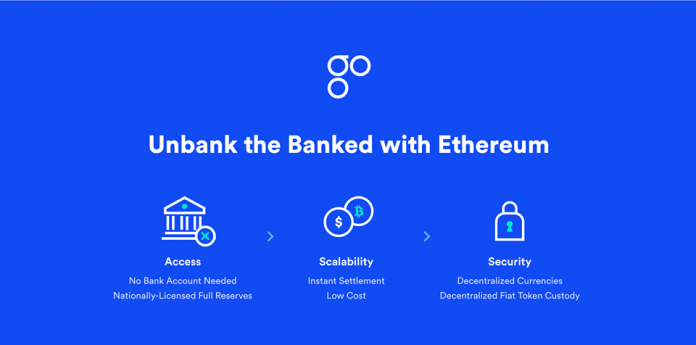Omise, a fintech startup operating across Asia, is building an Ethereum-based white-label digital wallet platform designed to enable real-time, peer-to-peer transactions and payment services at lower costs. It aims to improve financial inclusion and disrupt existing institutions.
 “OmiseGO basically is a wallet where people can actually cash in and cash out even if you don’t have a bank account,” said Donnie Harinsut, co-founder and COO of Omise, explained in a video presentation.
“OmiseGO basically is a wallet where people can actually cash in and cash out even if you don’t have a bank account,” said Donnie Harinsut, co-founder and COO of Omise, explained in a video presentation.
Built on Ethereum, OmiseGO is a fintech product for use in mainstream digital wallets and payment services that allows for decentralized exchanges on a public blockchain. It promises cheaper transactions, scalability and interoperability both at the application level between different digital wallets and financial services.
“The reason why we chose blockchain technology is that we want to build a network that people can actually trust,” Harinsut said. “For example, in Thailand, there is a lot of telcos that actually have their own wallets. But it’s basically a closed loop wallet. We want everyone to have access to financial services, no matter who you are in society.”
Wendell Davis, product development lead at the Omise Blockchain Lab and OmiseGO, and one of the original Ethereum founding team members, said that the lack of interoperability between digital wallets has hinted the growth of the overall space.
“There’s a lot of big push for this idea of e-wallets. Everyone has mobile phones these days and everyone would like to be able to easily send money from point to point, to make payments. But it is very difficult unless everyone is on a common platform,” Davis said.
Using OmiseGO is “just like using cash, except it is a lot more convenient in a lot of ways. It’s money in your pocket,” he said.
“What OmiseGO is able to do for the end-user is allow them to send money locally: they can send it to their family, they can make payments… It also allows them to send remittances across borders. So for example, maybe you are a migrant worker from Myanmar and you want to send money home back to your family.”
“OmiseGO is a platform you can use to do that,” Davis said, adding that the mission here is to enable users to “move money around anywhere they want at the most minimal cost possible.”
Omise, a venture-backed payments startup launched in 2013, has offices in Bangkok, Tokyo, Jakarta and Singapore. The company provides online and digital payment services in Asia and has raised over US$20 million in funding from the likes of 500 Startups, East Ventures, Golden Gate Ventures and SBI Asset Management.
“We can say that Omise is very uniquely positioned to provide this type of financial platform,” said Jun Hasegawa, CEO and founder of Omise Ltd. “This is because we already provide our payment services to thousands of business users in Asia.”
“Through OmiseGo, an open source platform, we can bring [the hundreds of millions of people in Asia who do not have a bank account] together and help them see what the bank of the future looks like in a way that reflects their present values.”
OmiseGO will comprise a decentralized exchange, liquidity provider mechanism, a clearinghouse messaging network, and an asset-backed blockchain gateway.
“The nice thing about OmiseGO’s design is it allows a shared ledger while also preserving privacy. And this is something we think people are going to want,” Davis said. “They are not going to want to expose their customer data and information to each other. But at the same time, they are able to verify and confirm that certain events have happened.”
 OmiseGO will be customizable to customers’ specific needs. Possible use cases of OmiseGO include payment (international remittances, P2P payments, bill payments, etc.), loyalty and rewards (manage points, trade and redeem, convert points to cash, gamification, etc.), and other financial services (B2B payments, supply chain, loans, deposits, etc.).
OmiseGO will be customizable to customers’ specific needs. Possible use cases of OmiseGO include payment (international remittances, P2P payments, bill payments, etc.), loyalty and rewards (manage points, trade and redeem, convert points to cash, gamification, etc.), and other financial services (B2B payments, supply chain, loans, deposits, etc.).
Access will be available to the public via the OmiseGO network and digital wallet framework starting from Q4’17.










